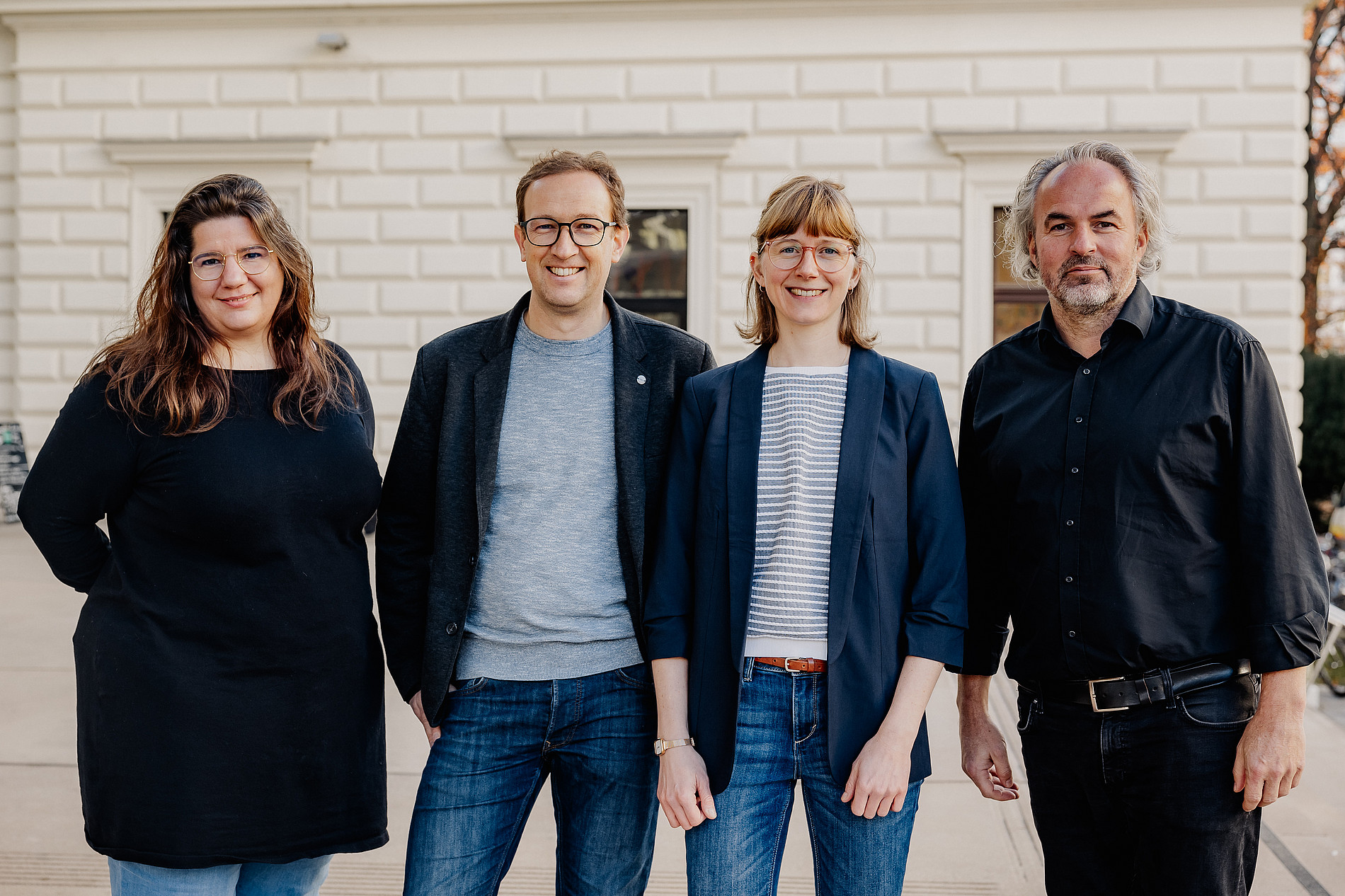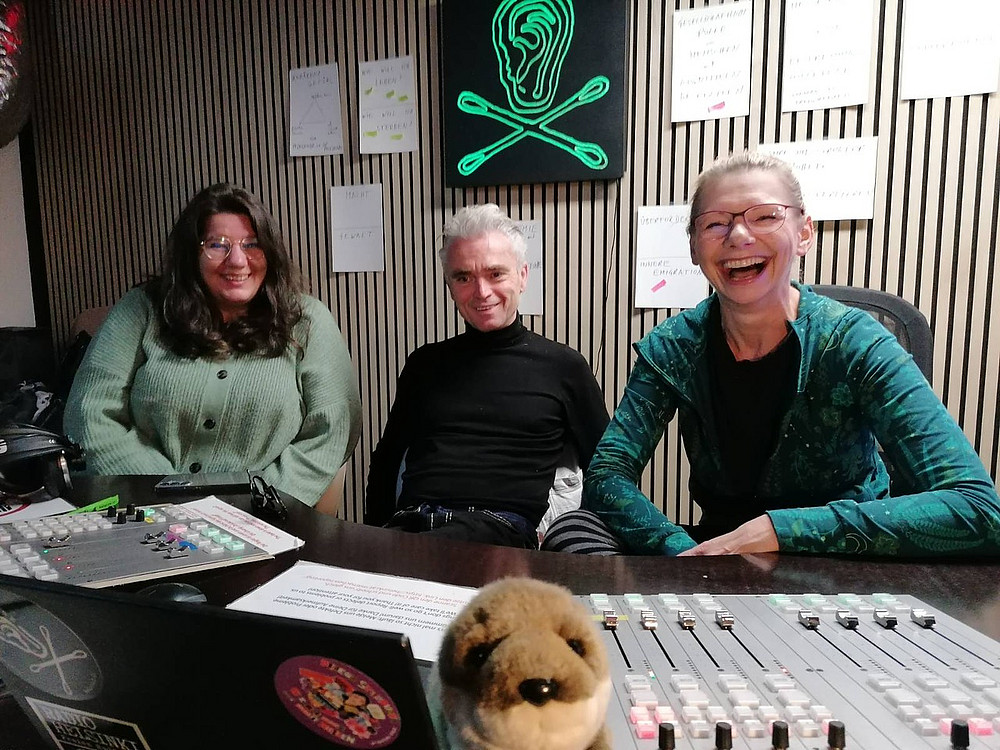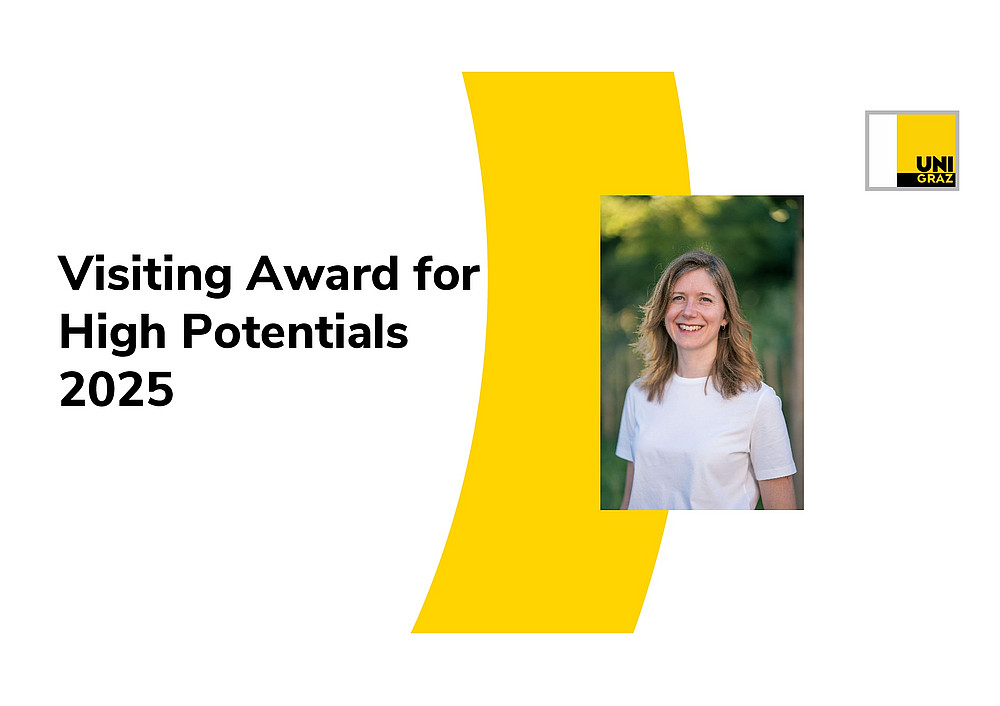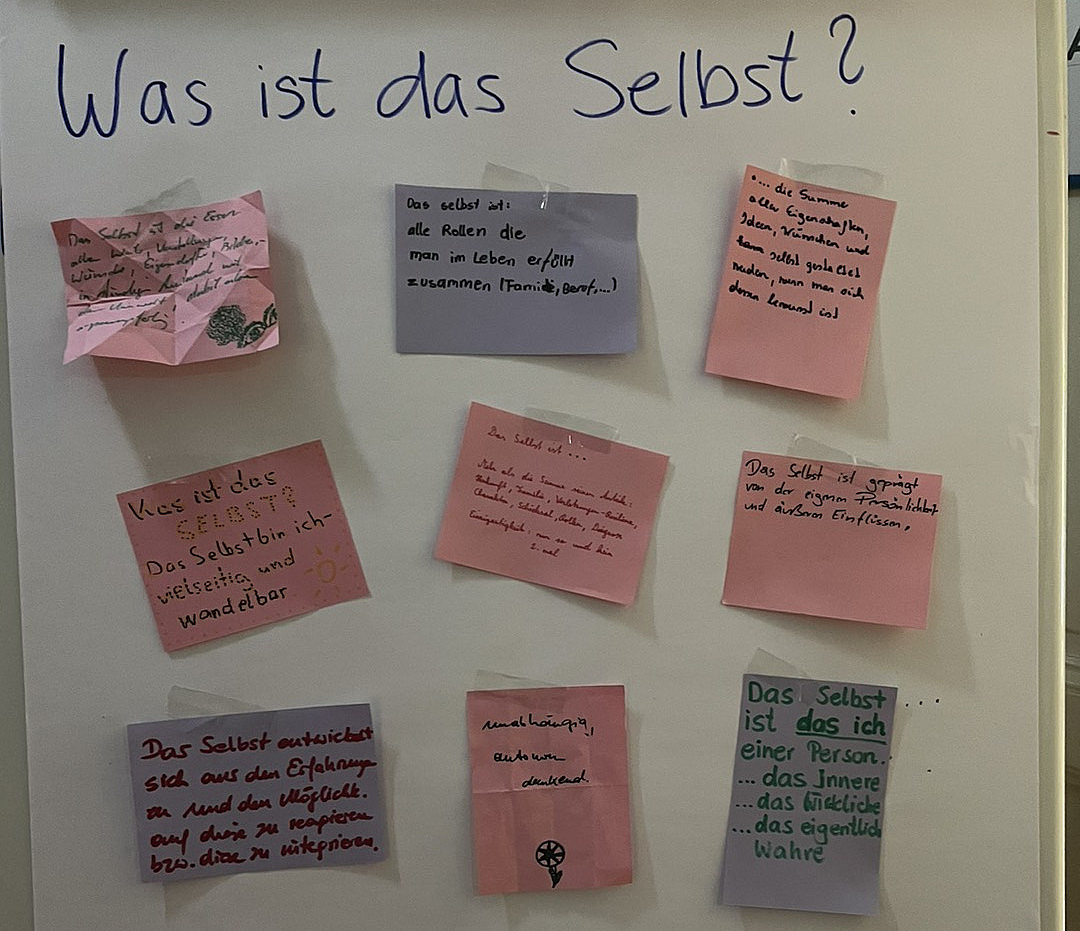Philosophical Practice in Palliative Care and Hospice Work
The Role of Philosophical Reflection for Developing Caring Cultures and Death Literacy
The declared goal of palliative care and hospice work is to improve the quality of life for the dying and their relatives. In the specific situation before death or existential loss, however, questions of a philosophical nature emerge—often with great existential urgency and clarity. It is therefore not surprising that the experience of such ultimate situations is, according to a definition by Karl Jaspers, considered as one of the deepest sources of philosophy itself. This direct engagement with death shows that philosophizing is not an elitist affair. The movement of “Philosophical Practice” draws attention to this.
Philosophical Practice evolved from the idea that theoretical philosophy is more than relevant for everyday life and, furthermore, philosophy itself can benefit from personal life experiences. Death and dealing with it are one of the main themes of philosophy. It is therefore surprising how little Philosophical Practice is already integrated into hospice work and palliative care.

In our research, we address the following questions: What does philosophical practice contribute (already or potentially) to the development of hospice care culture in our society? What is the significance of philosophical practice for end-of-life care? In addition, we explore the activities and experiences of philosophical practitioners in relation to the topics of dying, death and grief and we develop experimental models of everyday philosophizing in a participatory way with professionals from the field. Among other things, we expect to gain insights into the development of a caring society in both theoretical and practical terms.
Project duration: 15.12.2022 - 14.09.2026
Project lead: Associate Professor (FH) Dr. phil. Patrick Schuchter
FWF-Project number: P-35627
Team: Associate Professor Dr. Klaus Wegleitner, Stefanie Rieger, MA, Mag. Dr. phil. Sandra Radinger, BA
Achievements in the Project and of the Team Members
Radinger, S., Marinšek, U., Schuchter, P., Rieger, S. V., & Wegleitner, K. (under review). Philosophizing mortals? Exploring the actual and potential role of philosophical practice in end-of-life-care.
Radinger, S. & Brock, K. (forthcoming, 2026). Deutschkurse als Orte der Demokratiebildung: Zwischen politischen Ansprüchen und Spracherleben. In Taufner, J., Wegner, D. Artikulationen der Demokratiebildung. Springer.
Reckermann, J., Römhild R., Schmalz M., Radinger, S., Erling E. J., (forthcoming, 2026). Global Englishes Language Teaching in Germany and Beyond: On the Past, Present, and Future of an Emergent Field of Research. In Reckermann, J. & Römhild, R. (Eds.) Advances and Current Research in Global Englishes Language Teaching: Austria, Germany, and Switzerland. London: Bloomsbury Academics.
Schuchter P (2025) Handbook of Philosophical Self-Care. For those dedicated to hospice work and palliative care, Vienna: Hochschule Campus Wien. https://doi.org/10.34895/hcw.0031
Schuchter, P., Rieger, S. V., Radinger, S., and Wegleitner, K. Forthcoming. "Philosophische Begleitung: Das philosophische Gespräch und die spirituellen Dimensionen der Sorge in Palliative Care." In Spiritualität und Medizin: Gemeinsame Sorge für den kranken Menschen, edited by E. Frick, T. Roser, and G. Stotz-Ingenlatz, 3rd ed. Kohlhammer, 2026.
Rieger, S. V., Schuchter, P., Radinger, S., and Wegleitner, K. Forthcoming. "Von der Sorge zum Begriff: Potentiale Philosophischer Praxis in Care-Organisationen." In Care-Ethik und Politik – Berufsethische Reflexionen (Edition Centaurus – Perspektiven Soziale Arbeit in Theorie und Praxis), edited by E. Conradi. Springer VS.
Rieger, S. V., Radinger, S., Prato, A., and Schuchter, P., eds. 2025. Abstracts zur Tagung "Begegnungen in Grenzsituationen. Philosophische Praxis und Palliative Care im Dialog", 10.–12. Oktober 2025, Graz. Abstract volume for the final conference of the FWF project "Philosophische Praxis in Palliative Care und Hospizarbeit. Die Rolle philosophischer Reflexion in der Entwicklung von Sorgekultur und Sterbewissen" (P-35627) and the autumn colloquium of the International Society for Philosophical Practice (IGPP) and the Professional Association for Philosophical Practice (BV-PP). DOI: doi.org/10.25364/563.2025.1.
Schuchter, P., and Heller, A., eds. 2025. Praxis Palliative Care, 68. Thema: Philosophisch sorgen.
Schuchter, P. 2025. "Philosophieren am Lebensende. Warum Philosophische Praxis in der palliativen und hospizlichen Sorge fehlt – und gebraucht wird." In Praxis Palliative Care, edited by P. Schuchter and A. Heller, 68: 24–26.
Radinger, S. 2025. "Philosophieren in Gruppen. Vom gemeinsamen Versuch, Grenzerfahrungen zu verstehen." In Praxis Palliative Care, edited by P. Schuchter and A. Heller, 68: 24–26.
Rieger, S. 2025. "Von ersten und letzten Malen. Philosophieren als letzte Begleitung." In Praxis Palliative Care, edited by P. Schuchter and A. Heller, 68: 22–23.
Rieger, S. 2025. "Gemeinsam nachdenken. Übungen zum Philosophieren in der Palliative Care." In Praxis Palliative Care, edited by P. Schuchter and A. Heller, 68. Praxisbeilage.
Schuchter, P. and Lahav, R. 2025. "Deep Philosophy. Philosophieren aus innerer Tiefe als spirituelle Praxis." In Praxis Palliative Care, edited by P. Schuchter and A. Heller, 68: 43–45.
Schuchter, P., Radinger, S., Rieger, S. V., and Wegleitner, K. 2025. "Thoughtful Accompaniment in Life's Final Stages: Philosophical Practice as a Complement to Ethics Consultation." Bioethics. https://doi.org/10.1111/bioe.70031.
Ibrahim, O. and Rieger, S. V. 2025. "Philosophische Impulse zur seelsorglichen Gesprächsführung". In: Wege zum Menschen, 77:4, 270-281.
Schuchter, P., Rieger, S. V., Radinger, S., and Wegleitner, K. 2024. "Last Questions: How Philosophical Practice Contributes to Developing Death Literacy." In Palliative Care: Current Practice and Future Perspectives, edited by G. Bollig and E. Zelko, 1–15. IntechOpen. doi.org/10.5772/intechopen.1003175.
Rieger, S. V. 2024. "Vertrauen als Nährboden der Menschlichkeit. Ein Phänomen wider die Einsamkeit." In Praxis Palliative Care, 63: 41–42. Thema: sterbenseinsam und hoffnungsstark.
Rieger, S. V. 2024. "Wie Philosophie Verbundenheit unter Unbekannten stiftet. Der Beitrag einer inklusiven Philosophischen Praxis." In Leidfaden, 3: 20–22.
Radinger, S. and Wimmer, T. 2024. "Geschichte als ‚superb ally‘ in sprachensensibler Bildung: Materialien zur Auseinandersetzung mit der gesellschaftspolitischen Bedeutung (eigener) Bildungspraxis im (historischen) Kontext des mehrsprachigen Österreich." In Sprachen.Vielfalt fördern: Zukunftsperspektiven für die Qualitätsentwicklung in der Pädagog*innenbildung, edited by B. Schrammel, K.-B. Boeckmann, and D. Gilly, 97–111. Leykam. doi.org/10.56560/isbn.978-3-7011-0551-9-7.
Radinger, S. 2024. The Experience of Languaging: Integrating Applied Linguistics and Philosophical Practice in the Study of (English as a) Lingua Franca Communication [Dissertation]. University of Vienna, Vienna.
Radinger, S. 2023. "Reclaiming Voice in the Austrian Refugee Context Through Experiences of Ambiguity." In The Power of Voice in Transforming Multilingual Societies, edited by J. Gspandl, C. Korb, A. Heiling, and E. J. Erling, 61–81. Multilingual Matters.
Schuchter, P. 2025. "Über das Lebensende philosophieren." Online lecture, Am Lebensende philosophieren? Fachtag Ermöglichen – Befähigen – Ermutigen, November 6, 2025, Linz. Dachverband Hospiz Österreich.
Schuchter, P. 2025. "Initiativen für ein gemeinsam getragenes Lebensende." Plenary lecture, Caring Community Kongress 2025 D-A-CH, November 3–4, 2025, Cologne. caringcommunity-kongress.org.
Schuchter, P., Radinger, S., Rieger, S. V., and Wegleitner, K. 2025. "What Ultimately Moves Us: Insights into the Research Project." Keynote, Begegnungen in Grenzsituationen. Philosophische Praxis und Palliative Care im Dialog. Final conference of the project "Philosophische Praxis in Palliative Care und Hospizarbeit. Die Rolle philosophischer Reflexion in der Entwicklung von Sorgekultur und Sterbewissen" (P-35627) and autumn colloquium of the International Society for Philosophical Practice (IGPP) and the Professional Association for Philosophical Practice (BV-PP), October 11, 2025, University of Graz, Graz. hospizphilosophie.uni-graz.at/de/begegnungen-in-grenzsituationen/.
Aust, A., Rieger, S. V., and Krauß, J. 2025. "Philosophical Practice as a Response to Moral Distress in Care Work: An Outlook." Presentation, 18th International Conference on Philosophical Practice, June 12, 2025, Zagreb.
Rieger, S. V., Radinger, S., Schuchter, P., and Wegleitner, K. 2024. "From Concern to Concept: How Philosophical Practitioners Work with End-of-Life Topics." Presentation, XXV World Congress of Philosophy: Philosophy Across Boundaries, August 3, 2024, Rome.
Rieger, S. V., Radinger, S., Schuchter, P., and Wegleitner, K. 2024. "Philosophy as Psychotherapy? How Philosophers Discuss Philosophical Practice as Psychotherapy." Workshop, Perception in Philosophy and Beyond, May 8, 2024, University of Graz.
Rieger, S. V. 2025. "Welche Bedeutung hat Vertrauen im Kontext Philosophischer Praxis in existenziellen Krisen?" Presentation, 1. Forschungskolloquium der Internationalen Gesellschaft für Philosophische Praxis, May 2, 2024, Darmstadt.
Radinger, S., Schuchter, P., Rieger, S. V., and Wegleitner, K. 2024. "‘To Philosophize Means Learning to Die’: Developing Death Literacy in Communities of Philosophical and Palliative Care Practice." Presentation, 8th Public Health Palliative Care International Conference, October 23, 2024, University Center for Palliative Care Inselspital, University Hospital Bern, and University of Bern.
Rieger, S. V., Radinger, S., Schuchter, P., and Wegleitner, K. 2023. "Gesellschaft von der Endlichkeitserfahrung her denken? Vorstellung des Forschungsprojekts ‚Philosophische Praxis in Palliative Care und Hospizarbeit‘." Presentation, XXXVII. Kolloquium der Internationalen Gesellschaft für Philosophische Praxis, September 23, 2023, Salzburg.
Rieger, S. V., Radinger, S., Schuchter, P., and Wegleitner, K. 2023. "Contributions of Philosophical Practice in Palliative Care and Hospice Work for Age(-ing) and Care." Presentation, Age and Care Graz 2023, September 21, 2023, University of Graz.
Radinger, S. 2023. "Combining Applied Linguistics and Philosophical Practice: Contributions to the Study of ‘Languaging’ with a Focus on English as a Lingua Franca Research & Philosophical Practice in Palliative Care and Hospice Work: The Role of Philosophical Reflection for Developing Caring Cultures and Death Literacy." Presentation, 17th International Conference on Philosophical Practice, June 7, 2023, West University of Timișoara, Timișoara.
Rieger, S. V., Radinger, S., Schuchter, P., Wegleitner, K., and Esterl, M. 2025. "Philosophieren mit dem Mobilen Palliativ Team Graz." Workshop, Begegnungen in Grenzsituationen. Philosophische Praxis und Palliative Care im Dialog. Final conference of the project "Philosophische Praxis in Palliative Care und Hospizarbeit. Die Rolle philosophischer Reflexion in der Entwicklung von Sorgekultur und Sterbewissen" (P-35627) and autumn colloquium of the International Society for Philosophical Practice (IGPP) and the Professional Association for Philosophical Practice (BV-PP), October 10–12, 2025, University of Graz, Graz.
Radinger, S. and Brock, K. 2025. "‘Hast du auf das Baby aufgepasst, die Windeln gewechselt, gekocht? – Nein! Ich habe Prüfung:.’ Demokratie, Sprache und Migration: Politische Potenziale und Spannungen in der Deutschförderung von Immigrant:innen." Workshop, Artikulationen der Demokratiebildung, May 16, 2025, University of Vienna, Democracy Center Vienna, and Association of Austrian Adult Education Centers, Vienna.
Rieger, S. and Aust, A. 2025. "Philosophische Praxis als Orientierung in der Care-Arbeit." Workshop, Was heißt es, sich zu orientieren? Berufsverband für Philosophische Praxis. 3 .Mai 2025. Eisenach.
Rieger, S. and Radinger, S. 2025. "Einander im Denken begegnen: Wenn sich Philosophie und Palliative Care in der Praxis treffen." Online workshop, Endlich Philosophieren: Eine Online-Workshopreihe für Palliative Care und Hospizarbeit, March 6, 2025, University of Graz.
Rieger, S. and Radinger, S. 2024. "Denken beflügeln – Gemeinschaft leben." Presentation, Philosophische Impulse für die Caring Community Eningen: Miteinander Füreinander, June 27–29, 2024, Eningen unter Achalm.
Radinger, S., Schuchter, P., Rieger, S. V., and Wegleitner, K. 2025. "Philosophical Practice in the Development of Caring Communities: Insights from an Exploration with Eningen unter Achalm." Poster presentation, Begegnungen in Grenzsituationen. Philosophische Praxis und Palliative Care im Dialog. Final conference of the project "Philosophische Praxis in Palliative Care und Hospizarbeit. Die Rolle philosophischer Reflexion in der Entwicklung von Sorgekultur und Sterbewissen" (P-35627) and autumn colloquium of the International Society for Philosophical Practice (IGPP) and the Professional Association for Philosophical Practice (BV-PP), October 10–12, 2025, University of Graz, Graz.
Schuchter, P., Rieger, S. V., Radinger, S., and Wegleitner, K. 2024. "Am Rande des Lebens: Die Bedeutung philosophischer Reflexion in Palliative Care und Hospizarbeit." Poster presentation, Über Caring Communities zur Caring Society! 3. Sorgenetz-Symposium, November 27–28, 2024, Verein Sorgenetz, Vienna.
Poier, P., Schuchter, P., Rieger, S. V., Radinger, S., and Wegleitner, K. 2024. "Existentielle Kommunikation und die Kunst der philosophischen Frage in der palliativen Betreuung." Poster presentation, 8. Interprofessioneller Palliativkongress: Grenz-werte in der Palliative Care, April 4–6, 2024, Österreichische Palliativgesellschaft, Villach.
Schuchter, P., Rieger, S. V., Radinger, S., and Wegleitner, K. 2024. Am Rande des Lebens: Die Bedeutung philosophischer Reflexion in Palliative Care und Hospizarbeit. Online lecture, November 21, 2024.
Schuchter, P., Rieger, S. V., Radinger, S., and Wegleitner, K. 2025. Endlich philosophieren. Eine Online-Workshopreihe für Palliative Care und Hospizarbeit. Online lectures and workshops, March 6–27, 2025.
Schuchter, P., Rieger, S. V., Radinger, S., and Wegleitner, K. 2025. Begegnungen in Grenzsituationen. Philosophische Praxis und Palliative Care im Dialog. Final conference of the project "Philosophische Praxis in Palliative Care und Hospizarbeit. Die Rolle philosophischer Reflexion in der Entwicklung von Sorgekultur und Sterbewissen" (P-35627) and autumn colloquium of the International Society for Philosophical Practice (IGPP) and the Professional Association for Philosophical Practice (BV-PP), October 10–12, 2025, University of Graz, Graz.
Trouw | Nieuws en Verdieping: Op het sterfbed heb je een filosoof nodig. Lodewijk Dros. Gepubliceerd op 5 januari 2026, 22:00. https://www.trouw.nl/religie-filosofie/op-het-sterfbed-heb-je-een-filosoof-nodig-stelt-de-weense-filosoof-patrick-schuchter~bb24a4185/
Schrödingers Katze: Philosophieren angesichts des Lebensendes. 17. Dezember 2025. https://www.schroedingerskatze.at/philosophieren-angesichts-des-lebensendes/
Spirit of Styria: Wie das Sterben uns lehrt, zu leben. Von Lil Steinbach. Ausgabe 10/2025. S.60 - 62.
Radio Helsinki. 2025. Sendung zur Tagung “Begegnungen in Grenzsituationen”. By Karin Schuster. Pflegestützpunkt 6.0. December 19, 2025, 11:00–11:55 a.m. https://helsinki.at/program/144101/.
Radio Helsinki. 2025. Die gepflegte philosophische Nacht. By Karin Schuster. November 20, 2025, 7:00 p.m.–6:30 a.m. https://helsinki.at/program/144165/.
Punkt eins. 2025. Klassisches „Leben und Sterben lernen“. Moderated by Barbara Zeithammer. OE 1 (radio broadcast), October 9, 2025. https://oe1.orf.at/programm/20251009/810117/Klassisches-leben-und-sterben-lernen.
derstandard. 2025. Die letzten Fragen vor dem Tod: Wie Philosophie beim Sterben hilft. By Davina Brunnbauer. September 28, 2025. https://www.derstandard.at/story/3000000289222/die-letzten-fragen-vor-dem-tod-wie-philosophie-beim-sterben-hilft?ref=niewidget.
UniZeit. 2025. Magazin der Universität Graz: Zu Ende gedacht. By Dagmar Eklaude. UniZeit 3/2025. https://uni-graz.e-publikation.de/de/3-2025/schuchter.
Radio Helsinki. 2024. Herr Fritzl kommt ins Heim. By Karin Schuster. Pflegestützpunkt 5.0. September 27, 2024, 11:00–11:55 a.m. https://helsinki.at/program/134737/.
PhiloSozial: Von Stefanie V. Rieger und Ada Aust. (Podcast)
New Connection to the University of Applied Sciences Campus Vienna
Since September 2025, Patrick Schuchter is a senior researcher at the Center for Applied Nursing Research at the University of Applied Sciences Campus Vienna. Here are his new contact details.
Patrick has already been introduced in an interview. Click here for the link.

Caring night of philosophy
Karin Schuster, Robert Irmler, and Stefanie Rieger hosted conversation partners from Philosophical Practice, literature and culture, care professions, academia, and the interested public in the recording studio of Radio Helsinki during the night of November 20 to November 21, 2025 (7:00 p.m. to 6:30 a.m.).
The conversation partners were either present live in the studio or joined via telephone.


Visiting Award for High Potentials 2025 for our team member Sandra Radinger
Sandra Radinger receives one of the mobility scholarships granted by the University of Graz within the year of 2025. These scholarships are part of the University’s „Leitprojekt 2“ which aims to support early career researchers with high potential in academia. We are glad that Sandra Radinger will use the Visiting Award for a research stay at the University of South Eastern Norway to connect with colleagues in philosophical practice. These colleagues, Guro Hansen Helskog und Michael Weiss, do research in the areas of Spiritual Care, Reflective Practice Research, und Teacher Education.
Philosophical practice for the (nascent) caring community Eningen unter Achalm
In close cooperation with the community of Eningen unter Achalm, the members of our research project developed a program to support them on their way to becoming a caring community - with formats from philosophical practice. From 27-29.6.24 Sandra Radinger and Stefanie Rieger conducted the workshop "Encouraging Thinking - Living Community. Philosophical impulses for the Caring Community Eningen: With each other for each other" and were able to inspire 9 enthusiastic caring people for philosophical practice.
The participants were empowered to identify and articulate fundamental themes and philosophical questions in their daily lives. Accompanied by our philosophical practitioners they develop philosophical mini-activities and give philosophical impulses to the Caring Community Eningen. In this way, fundamental questions of the community become visible and a space for encounter and exchange is created - not only on the level of experience, but also on the level of joint articulation of concerns.
The insights gained can then be translated into content and practice - for the Caring Community Eningen as well as for research.
Take a look at the PowerPoint presentation of the event here.
Research with the Mobile Palliative Care Team Graz/Graz Umgebung
Sandra Radinger and Stefanie Rieger accepted the generous invitation from the Mobile Palliative Care Team Graz/Graz Umgebung to test the effectiveness of philosophical practice formats for the profession on site. This resulted in three assignments on the premises of the Mobile Palliative Care Team in November 2023, May 2024 and June 2024.
Formats such as philosophical cafés, philosophical walks, contemplative elements and much more were offered. Between two dates, the participants were also accompanied with philosophical questions via their work cell phones.
The feedback from the participants and their team leaders was overwhelming.
Assoz. FH-Prof. Mag. Dr. Patrick Schuchter MPH
Project lead Zentrum für interdisziplinäre Alterns- und Care-Forschung
Schubertstraße 23
8010 Graz
https://hospizphilosophie.uni-graz.at/de/
Dipl. Sozialpäd. (FH), Ak. Phil. Praktikerin Stefanie Veronika Rieger MA, Syst. Beraterin (SG)
+43 316 380 - 3679
Zentrum für interdisziplinäre Alterns- und Care-Forschung
Schubertstraße 23
8010 Graz
https://hospizphilosophie.uni-graz.at/de/
Mag. Dr. phil. Sandra Radinger BA
+43 316 380 - 6156
Institut für Pastoraltheologie und Pastoralpsychologie – Universität Graz
Heinrichstraße 78A/DG, 8010 Graz
https://hospizphilosophie.uni-graz.at/de/
Assoz. Prof. Mag.rer.soc.oec. Dr.phil. Klaus Jürgen Wegleitner
+43 316 380 - 6155
Institut für Pastoraltheologie und Pastoralpsychologie – Universität Graz
Heinrichstraße 78A/DG, 8010 Graz
https://hospizphilosophie.uni-graz.at/de/

